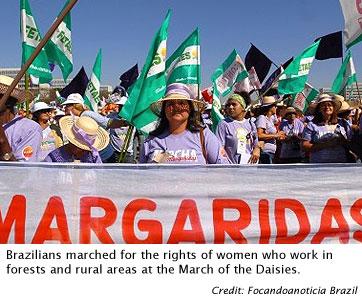
Source: Women’s E-News
Thousands of Brazilians–mostly women–converged in the capital here last month to call for improved rights for women who work in rural areas and forests in the fourth March of the Daisies.
The women, or “Margaridas,” which means “daisies” in Portuguese, wore purple shirts and straw hats–the uniform of their movement.
Since 2000, the Daisies have achieved the right for rural female workers to retire at age 55 with public retirement benefits, gained property through land reform and expanded their access to identification documents to allow them to benefit from government policies.
“The Daisies’ March is a demonstration that pressures the government for women’s rights, wage equality, land distribution for family agriculture–that is, policies that favor women and rural workers in general,” says Maria Luiza dos Santos, a rural worker from Afonso Cunha, a city in the interior of Maranhao state.
This year, the women presented a list of 150 demands to President Dilma Rousseff, a longtime Daisy ally known for her slogan, “A wealthy country is a country with no poverty.”
Rousseff responded to the Daisies the day after the march, promising to build 16 floating facilities in forest rivers to provide basic health care to workers and 10 centers to enforce health and safety standards in the workplace by 2012.
The president also promised to invest more in family-owned farming immediately and to implement a national program on sustainable agriculture to benefit women from the forests and rural communities.
“Rousseff reunited the media, civil society organizations and the ministers and answered the demands of the Margaridas with the launching of a national program on maternal health, for example,” says Kelly Cristina Goncalves, a member of the Articulation of Brazilian Women, a nonpartisan group that encourages women’s political participation.
Abortion Omitted
But Goncalves says the Daisies omitted some issues that were central to her group.
“Sexual and reproductive health, including the demand to decriminalize abortion, a constant topic in the feminist movement in Brazil, were barely mentioned in the document, and they remain a taboo,” she says. “This might be due to the hierarchical structure of workers’ unions, who were leading the organization of the march and, internally, are still dominated by men. We can see that there are still inequalities when it comes to decision-making.”
The National Confederation of Workers in Agriculture, the largest rural workers’ union in Brazil, organized the first march in 2000 in homage to Margarida Maria Alves, a union leader shot in 1983 at age 50. She has become a symbol for the feminist struggle for land, work, equality and justice.
This latest march, on Aug. 17, had a theme of “sustainable development with justice, autonomy, equality and freedom” and drew the largest crowd yet, about 70,000, according to police estimates.
“This was a true achievement by the rural workers,” Goncalves says. “It was very inspiring to see all those courageous people, who, in some cases, spent four days traveling on a bus to get here, in addition to the four hours marching under the sun, fighting for their rights with a smile on their faces.”
As delegations arrived, they set up tents in a park in Brasilia, building what they called the “City of Daisies.” Representatives from many organizations brought handcrafts from their regions to sell and exchange with their fellow Daisies. Nongovernmental organizations also distributed informative material about women’s health and gender equality.
Rejane Pitanga, a congresswoman from the federal district, says the march’s main victory was gaining visibility for causes championed by rural female workers.
“It projects women as protagonists of federal politics, something that would be unimaginable a few decades ago,” she says.
Adapted from original content published by the Global Press Institute. Read the original article here. All shared content has been copyrighted by Global Press Institute.
Thais Moraes reports for Global Press Institute >s Brazil News Desk. Based in Recife, Brazil, she focuses on human rights issues.
